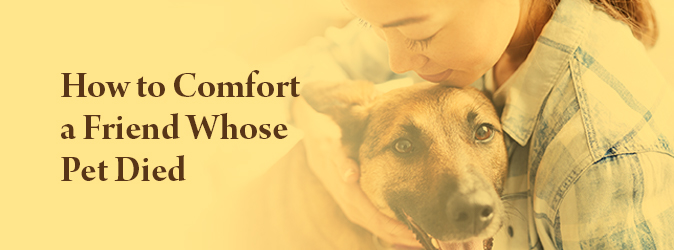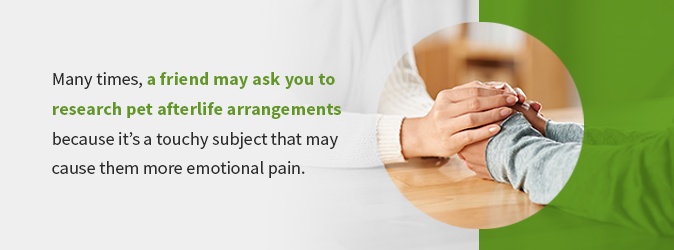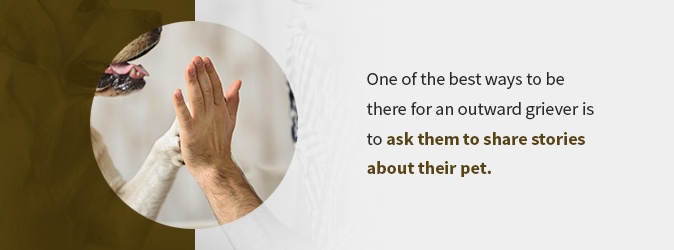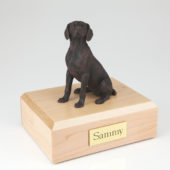
In times of tragic loss, many people reach out to their friends and family for sympathy, while others keep to themselves. Knowing how to support your friend during an emotional time can help them feel more at ease. With the right insight and knowledge, you can understand what type of griever they are and learn how to care for them in the best way possible.
Agape Pet Services is here to guide you in taking the right steps to be there for your friend, whether it’s sitting down and listening or helping them find a positive outlet for their sorrows.
My Friend Lost Their Pet — What Can I Do?
The initial phase is to comprehend bereavement and learn about various kinds of grieving outlets. The key to comforting a friend who lost a pet is to be empathetic. Put yourself in their shoes, see their perspective and recognize their emotions.
1. Understand What They’re Going Through and How They May Project Grief
Your first step is to understand bereavement. Grieving isn’t reserved for the loss of humans, and feeling emotionally vulnerable is natural when you lose a pet. Your friend needs to process their feelings.
Sometimes the loss of a pet can be overwhelming. However, your friend can cope by talking to a friend, family member or a grief counselor. They can ask about funeral arrangement support from their veterinarian or local pet crematorium. They should also have enough time to grieve according to their own terms.
The next phase is to figure out what type of griever they are. It’s imperative to understand that people mourn differently — there is not a one-size-fits-all way to support your friend. Sorrow is a natural reaction to losing something important and loved. People can grieve through physical, social, behavioral or cognitive approaches.
Various types of mourning can range from delayed, complicated and chronic to masked, distorted and inhibited. Learn more about the kind of grief your friend expresses to help you better empathize with their sentiments.
2. Ask Them What They Need From You
Instead of assuming what your friend wants, ask them what they need or how you can help. If you’re willing to lend a hand, it can relieve a bit of stress from their life. Many times, a friend may ask you to research pet afterlife arrangements because it’s a touchy subject that may cause them more emotional pain.
If you’re willing and able, make any afterlife preparations according to their specific requests. You also may be able to help by completing daily tasks like grocery shopping, house cleaning or making dinner.
However, some people may not want hands-on support and prefer personal space. They may feel comfortable doing things themselves instead of relying on someone else. That’s why it’s crucial to ask what you can do instead of assuming.

Support Them Based on How They Grieve
Knowing how someone deals with heartache can help you be the best support system. Studies show that people experience a significant attachment to their dogs, cats and other pets and undergo substantial stages of grief reactions.
1. Inward Griever
If your friend displays instrumental grief, it means they are an inward griever. They need time and space to recognize and deal with their feelings. Your friend will reach out if they need support.
Although your friend may not want physical or verbal condolences after they lose a pet, you can still show you care through a less intrusive way. For example, you can share resources or information about a local pet loss support group. You can even send them poems or genuine quotes about losing a loved one. Giving them ideas on how to memorialize their companion or how to celebrate the life of their pet may soothe their emotions.
In other cases, people may choose to distract themselves. If they reach out, offer to do different activities to help them focus on more positive aspects. Your friend may also resort to humor. But don’t think they are playing off their loss. Humor can often provide the same emotional release as crying.
Listen and observe how your friend mourns. Then, provide the best care possible, depending on their wishes.
2. Outward Griever
An outward griever is intuitive by relying on their friends and family for love and empathy. One of the best ways to be there for an outward griever is to ask them to share stories about their pet. You can also verbalize your fondest memories to show you loved their furry friend as well. Allow them to talk about their emotions. If they need to tell their favorite story a million times, then let them.

Being there for your friend in a time of tragedy means you often have to listen more than you talk — be accepting and patient. If it feels natural, cry with them and show signs of affection. Physical comfort, like holding their hand or touching their shoulder, gives a feeling of comfort without having to say anything.
You can also bring them something to help them memorialize their pet, such as a plant, personalized gift or flowers. Even bringing your friend their favorite food, cooking dinner or helping them set up a new routine can be meaningful.
What You Can Say
The best way to comfort someone dealing with the loss of a beloved pet is to console them in person. Always mean what you say and stick with them, whether it takes your friend a few weeks, months or years to come to terms with their loss. Simply validate their grieving and emotions.
In Person
Several things you can say include:
- “Nothing I say can make you feel better, but I’m here for you.”
- “I know you loved them dearly.”
- “They were part of your family.”
- “If there is anything I can do, please let me know.”
- “What can I do to help you?”
- ‘”They were lucky to have you.”
- “No matter what, I’ll be by your side.”
- “Please know I’ll be thinking of you.”
You can also recall positive memories of their dog or cat and explain how their pet positively impacted your life — touch on how you will miss them or any personal stories about their furry family member.
In a Card
If you choose to write a sympathy card, display the same emotions and feelings of comfort as you would in-person. Sending a comforting message may feel intimidating, but your words can reach further than you expect. Even offering to help with daily tasks can ease their grief. Comforting statements you can write in a card include:
- “I’ve been thinking of you. How are you holding up?”
- “I’m praying for you and your family.”
- “I’m sorry for your loss. They will be missed.”
- “They were lucky to have you as their owner and best friend.”
- “Sending loving thoughts your way.”
- “If you need to talk, I’m always here.”
- “Wishing you peace and comfort during this difficult time.”
- “Don’t hesitate to call me.”
- “If you need to sit down and talk, let me know.”
- “Losing a part of your family is never easy.”
Try not to send messages through text or email because it’s less personal. Sending a card or handwritten letter is more heartfelt and thoughtful.
What Not to Do
It’s easy to feel uncomfortable when your friend is mourning the loss of their pet, but it’s important not to say the wrong thing. Don’t try to fix the problem, give them pep talks or offer advice. Let the process take its course and avoid using logic because it’s not comforting. Guidance on what not to say includes:
- Using euphemisms
- Avoiding saying the pet’s name
- Filling awkward silences
- Telling them, “It will be okay.”
- Saying, “It’s for the best,” or, “Think of all the great memories.”
- Comparing their pain to another’s
- Recommending they get another pet
- Saying you understand how they feel because no one grieves the same way
- Implying that time heals all wounds
- Saying their pet is in a better place
- Comparing their pet’s loss to your own experience
- Imposing a timeline of feeling better
People don’t want to hear false hope or cliché sentiments. Your friend isn’t looking for a replacement pet, either. They will get another when their heart is ready to move on. Supporting your friend after they lose their best fur friend is all about knowing their needs and being genuine.
A Helping Hand When You Need It the Most
Agape Pet Services offers private cremation, group cremation, private viewing, bereavement support and in-home pickup for those who are experiencing a loss. As a pet crematorium, we are here to care for you or your friend during a time of emotional mourning. We work to make a personal connection with you to understand your love for your pet.
Reach out to us and speak with one of our compassionate representatives or browse our services. Agape Pet Services empathizes with your loss and is here to help you through the grieving process.




